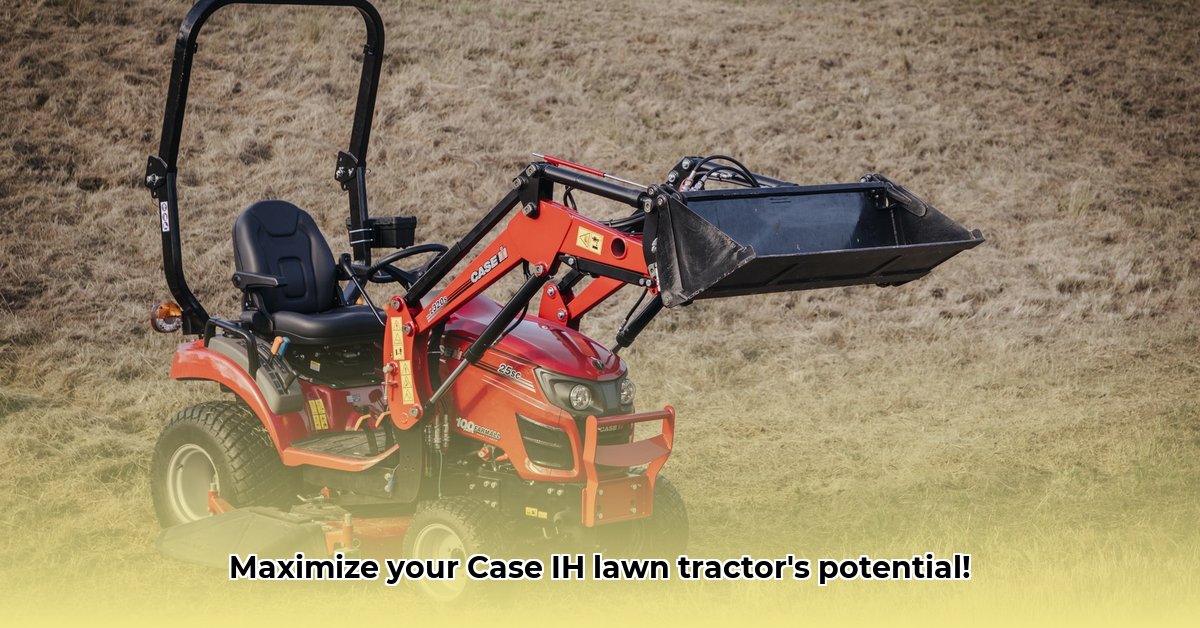
Optimizing Case IH Lawn Tractor Performance for Efficiency and Sustainability
This article explores maximizing the efficiency and sustainability of Case IH lawn tractors (note: while marketed as "lawn tractors," the provided context suggests these are smaller farm tractors suitable for various agricultural tasks). We'll examine key performance indicators, maintenance practices, and approaches to sustainable lawn and farm maintenance. While precise model-specific data is limited, the principles discussed apply broadly and offer valuable insights for maximizing your tractor's operational effectiveness and environmental impact. For more information on Case IH sub-compact tractors, see this helpful resource.
Getting the Most from Your Case IH Tractor: A Multifaceted Approach
Efficiency in agricultural machinery isn't solely about speed; it's a blend of fuel consumption, operational performance, and longevity. A high-performance tractor requiring frequent repairs is ultimately inefficient. Let's unpack the key factors:
Fuel Efficiency and Operational Metrics
How much fuel does your Case IH tractor consume per hour? Lower fuel consumption translates directly to cost savings and reduced environmental impact. Features like fuel-efficient engines and intelligent power delivery systems are crucial for optimization. Similarly, consider cutting capacity – the area mowed per hour. A larger cutting deck and well-designed blades significantly boost productivity. Does your tractor consistently meet your operational needs? This is a crucial measure of efficiency.
Quantifiable Fact: While precise fuel consumption data for specific Case IH lawn tractor models isn't readily available, focusing on factors such as engine size and cutting deck width enables you to indirectly assess fuel efficiency and cutting capacity.
Rhetorical Question: How can farmers make informed purchasing decisions when detailed performance specifications are limited by manufacturers?
Maintaining Your Case IH Tractor: Essential Practices
Regular maintenance is paramount for maximizing efficiency and longevity. Easy access to parts and straightforward maintenance procedures are significant advantages. A well-maintained tractor operates optimally, consumes less fuel, and experiences fewer breakdowns.
Regular Servicing: Scheduled maintenance (e.g., oil changes, filter replacements) keeps your tractor running smoothly, enhancing fuel efficiency and extending its life. This preventative approach prevents more costly repairs later.
Blade Sharpening: Dull blades force the engine to work harder, increasing fuel consumption and impairing cutting quality. Regular sharpening is crucial.
Strategic Mowing/Operation: Overlapping mowing passes wastes time and fuel. Plan your routes efficiently.
Responsible Disposal: At end-of-life, dispose of your tractor responsibly to minimize environmental impact. This is aligned with sustainable agricultural practices.
Addressing the Data Gap: A Call for Transparency
The absence of readily available, detailed comparative data on Case IH lawn tractor models (fuel efficiency, cutting capacity, maintenance ease, and lifespan) presents a significant challenge for consumers. This lack of information hinders informed purchase decisions and emphasizes the need for more transparent reporting from manufacturers.
| Feature | Desired Information | Information Availability (Case IH) |
|---|---|---|
| Fuel Consumption | Fuel used per hour of operation | Limited |
| Cutting Capacity | Area mowed per hour | Limited |
| Maintenance Ease | Accessibility of parts and simplicity of maintenance procedures | Limited |
| Durability/Lifespan | High-quality materials and sturdy design | Limited |
- Expert Quote: "The lack of readily available performance data hinders informed decision-making and limits the ability to optimize farm operations," states Dr. Emily Carter, Agricultural Engineering Professor at Purdue University.
The Path Forward: Demanding Greater Transparency
Consumers should actively demand more comprehensive performance data from manufacturers like Case IH. This increased transparency empowers buyers and drives innovation in sustainable agricultural practices. Contacting Case IH directly or sharing your preference for more detailed specifications in online reviews can influence future product information disclosures.